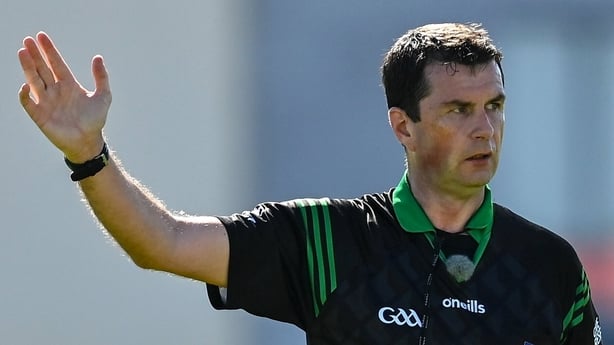Who would benefit from referees giving post-match interviews? Would it be an opportunity for fans to better understand the decisions made on the pitch? Could it offset some of the anger that builds in the wake of supposedly controversial decisions?
Referees rarely, if ever, give post-match interviews. But perhaps if they did, would we the fans, the players, the mentors - and the referees themselves - receive any benefit? Perhaps.
After a recent trial in August conducted by TG4, in which they mic'd up referee John O'Halloran for the Kerry Senior Hurling Championship final, there were several people who were enthused by the idea.
As the action unfolded, viewers were able to understand exactly why the referee made a certain decision.
This is not a new phenomenon; it has been the case for several years in sports such as American football and rugby union - a sport others look to as the standard bearer for respecting match officials.

"At the moment, there probably isn't that protocol in place where I can come out and explain a decision," said Cork referee Colm Lyons.
"It's all about communication. I think we can all do a bit better in terms of explaining decisions. I think most of the decisions stand for themselves. We'd be the first as referees to put our hands up and say, 'look, we got it wrong'.
"Does everybody as a player, manager, coach, selector say 'we got it wrong'? Some will, some won't. I think referees, we're very open to improving."
Earlier this year, RTÉ Head of Sport Declan McBennett hinted at the idea of mic-ing up referees after a brawl between Tyrone and Armagh players in the Allianz National League.
McBennett wished for "the ability for referees to articulate their decisions".
"That match between Armagh and Tyrone, most people didn't know why there was five players sent off. They didn’t know why there was four from Tyrone and one from Armagh got sent off," said McBennett.
Or perhaps would the general public berate officials all the more if they are privy to the on-field decision making process?
"We want to come off that field and say, 'do you know what? There wasn't an incident there now that is going to cause us contention tonight'," said referee Lyons.
"Or if you're sitting down [after a game], 'will we watch The Sunday Game? Will we avoid The Sunday Game?'"
Tyrone referee Sean Hurson got the big one this year. He was the man in the middle for the All-Ireland SFC final between Kerry and Galway.
Hurson is an experienced official, with vast amounts of experience refereeing in the often intense Ulster Football Championship.
He made reference to pressure put on inexperienced referees by both players and management.
"I think when you're starting out refereeing, everybody’s trying to find a weakness and they’re trying to gain a benefit to their team so coaches and players are focusing on what they can get away with," said Hurson.
"The culture is there: how can we get better at beating the opposition? Sometimes they reflect on weaknesses or perceived weaknesses of the referee and unfortunately that’s what’s happening with our coaches."
President Larry McCarthy and referees David Coldrick and Colm Lyons told @MartyM_RTE that they hope the culture of abuse against officials in the #GAA can change as they launched 'Respect the Referee Day' pic.twitter.com/lwlAJX0xbb
— RTÉ GAA (@RTEgaa) October 13, 2022
Influencing the referee, 'playing the referee', has become a fixture of pre-match analysis for teams at all levels.
While mic-ing up referees at inter-county level could work at that level, the club game would represent different challenges.
It would also set an example not just to playing members but young players who take inspiration from watching their heroes every summer Sunday.
While post-match interviews might not be the answer for developing an understanding of refereeing decisions, on-field microphones might allow us, the audience, to understand them better.
Some, like rugby's Nigel Owens, have thrived. He emerged as one of the best referees in the world while also showing us his personality, which helped to make him more respected, and proved that referees are not robots; they are human too.
Setting an example from the top, which GAA president Larry McCarthy is attempting to do with this weekend's Respect the Ref campaign, is the association's best hope of changing attitudes towards and around referees.
Listen to the RTÉ GAA Podcast at Apple Podcasts, Soundcloud, Spotify, or wherever you get your podcasts.
Watch the Leinster Football Club Championship Round 1 game, Palatine (Carlow) v St Patrick's (Wicklow), on Saturday from 7.45pm live on RTÉ2 and RTÉ Player


